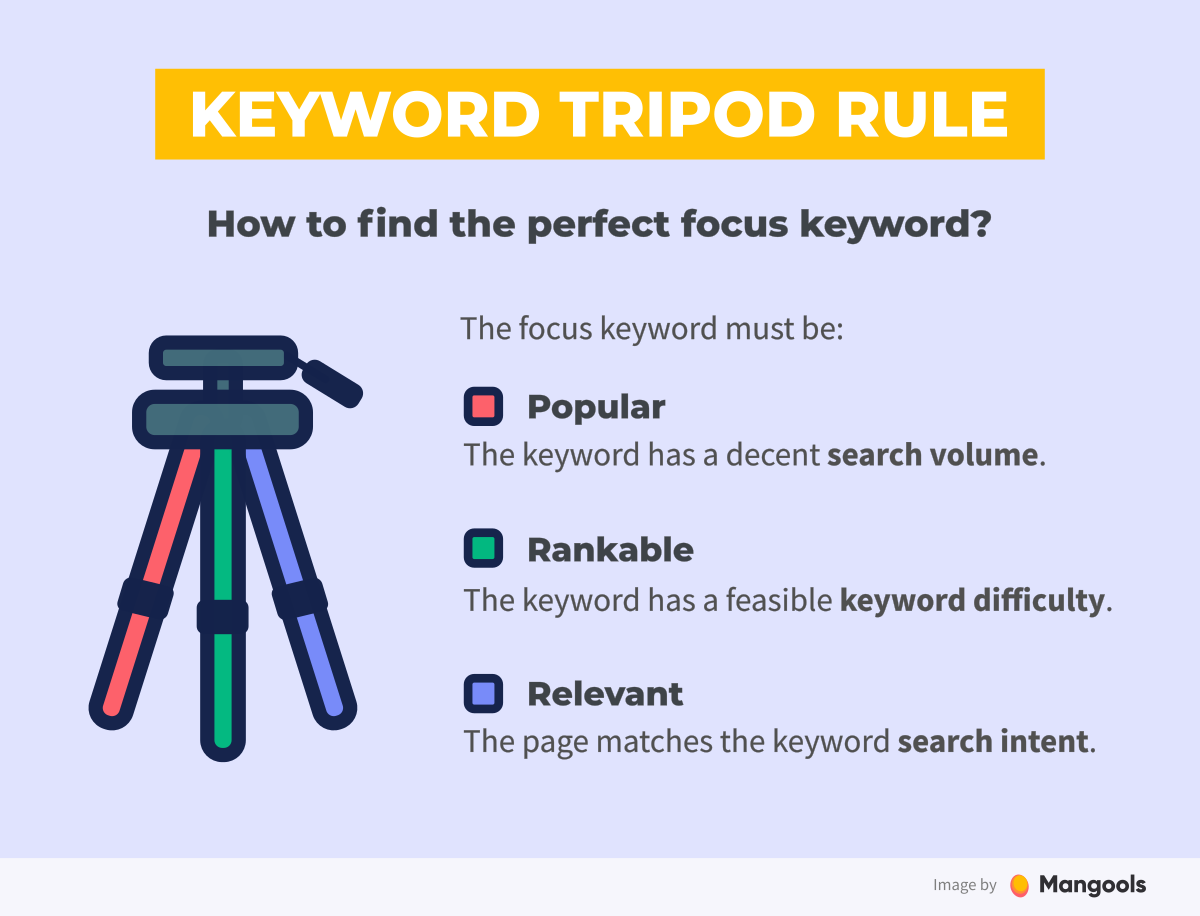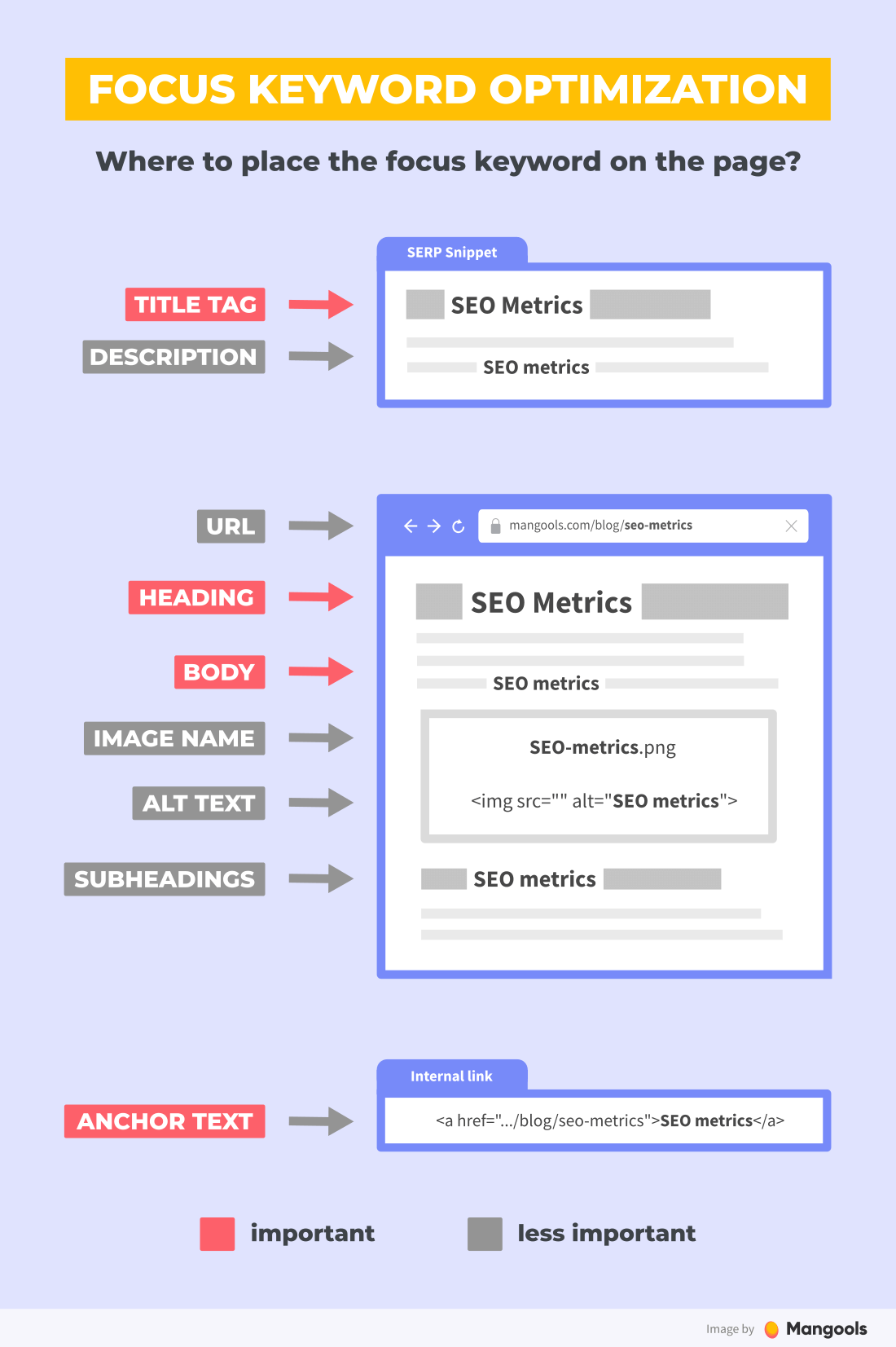What is a focus keyword?
A focus keyword is the best representation of your page’s topic that helps you to focus on the topic and optimize your page for the said topic. It should be placed in the key areas of the page such as a title tag, heading, text, etc.
The rule of thumb is: Each page should have one focus keyword.
Let’s take a look at the focus keyword concept more practically with some examples:
- For a blog post about home gardening tips, the content could be optimized for the focus keyword “home gardening.”
- An online store selling eco-friendly products might use “sustainable products” as a focus keyword for a product category page.
- A financial advice website discussing retirement planning could use “retirement planning” as the focus keyword for a guide on the subject.
These focus keywords capture the essence of the content, guiding both search engines and visitors in understanding the main topic of the page.
By carefully selecting and strategically placing focus keywords, you can improve the relevance of your pages for those keywords, making them more likely to rank higher in search results.
Note: Do not mistake a focus keyword with a meta keyword tag. While having the focus keyword for each page is an important part of your SEO strategy, the meta keyword is an HTML tag Google does not take into consideration anymore.
Topics vs keywords vs focus keywords
The words “topic” and “keyword” can be used interchangeably because the difference is quite often very little.
For example, let’s say you want to write an article called 10 Pilates Exercises That’ll Give You Rock Hard Abs.
if someone asked you to describe the topic of the article, you would probably say something like “pilates abs exercises” or “best pilates abs exercises”. So you would basically used “keywords” to describe the “topic” of the post.
The focus keyword is the best keyword representation of the topic. You pick this focus keyword intentionally based on various factors you need to consider when doing keyword research (more about them below).
In our example, the best focus keyword would probably be “pilates abs exercises”
Keywords are the words or phrases that describe the common themes found within your content. For this one, you might have keywords like “at-home workouts”, “ab exercises”, and “fitness routines”.
How do you find the right focus keyword?
Writing high-quality and highly relevant content for your website is important. However, if you want any of that content to rank, there has to be a strategy behind it.
Choosing the right focus keywords for the most important pages and posts on your site is an important step in that strategy.
A simple rule you can follow when selecting your focus keyword is the so-called Keyword Tripod Rule.

It tells you to always keep in mind the three most important factors :
- popularity of the keyword (how many people use the keyword in their searches?)
- rankability of the keyword (how hard it is to rank for the keyword?)
- relevance of the keyword (is the keyword relevant to your content?)
You can measure and evaluate all these 3 aspects in our keyword finder tool and determine which search queries in your niche should be your focus keywords.
How do you use the focus keyword?
Once you’ve found the perfect keyword for your content, it’s time to put it to work.
Step 1: Choose one unique focus keyword for your page
Each page should have one focus keyword.
So if you’ve gotten to this point with a few you want to optimize for, ditch all of them but one. If the others are relevant, they’ll naturally appear within the page anyway.
In addition, each page should have a unique focus keyword.
For example, let’s say you’ve built a website for your grooming business. You have a Grooming page under your services and have optimized it around “ grooming”. You also have a blog post that touts the benefits of professional grooming and you’ve optimized it for “ grooming”, too.
It is quite rare to rank with two different pages on the 1st SERP. If you’re not already ranking in the top ten for your focus keyword, don’t make it harder by providing more competition for yourself. For example, you can make your focus keywords more specific and optimize the Grooming page around “ grooming services” and the blog post around “benefits grooming”.
Step 2: Write the content
As a best practice, the focus keyword should be chosen before you write the content. This allows you to write a comprehensive and competitive piece of content for the focus keyword, rather than try to pick a viable keyword from the page after the fact.
While the remaining steps focus on keyword optimization and analysis, it’s important to take your time here.
Content quality is the most important thing to Google. If you’re not creating highly relevant and readable content specifically for your audience, it’s not going to rank no matter how good of a focus keyword you choose.
Step 3: Optimize your content around the focus keyword
There’s no official way to tag your focus keyword and tell Google: “Please rank this page for this keyword.”
What you can do instead is include the focus keyword in the key parts of the page where Google is going to look for it.

The most important places to put your focus keyword are:
- The title tag
- The heading of the page (and subheadings, if relevant)
- The body of the page (ideally in one of the first paragraphs of the text)
- Anchor texts of internal links pointing to the page
Note: Keep in mind that focus keyword optimization isn’t some technical checklist that has to be fulfilled. If the keyword cannot naturally be added to less important areas — like image alt text or subheadings — there’s no need to force it.
Step 4: Find the right balance
Keyword stuffing is a big no-no in search engine optimization. Google hates it and part of the reason is that it creates a terrible experience for your visitors.
While your focus keyword should have a decent presence within your content, it should never completely overwhelm the messaging to the point where it looks unnatural.
On the other hand, if you’re struggling to incorporate it into your content, then that’s a problem as well. In this chat with Google’s John Mueller, someone explained a problem they were having with their focus keyword not appearing until the bottom of their 20,000-word page.
Essentially, John Mueller says that it needs to be perfectly obvious to visitors and to Google what the page is about. If it takes you 19,000 of your 20,000 words to introduce the main topic, then you have a problem.

